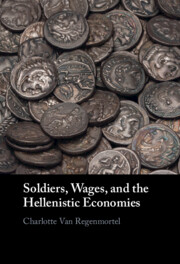Book contents
- Soldiers, Wages, and the Hellenistic Economies
- Soldiers, Wages, and the Hellenistic Economies
- Copyright page
- Dedication
- Contents
- List of Tables
- Acknowledgements
- Note on Transliteration and Translation
- Chronology
- Abbreviations
- List of Maps
- Maps
- Introduction
- Chapter 1 Contextualizing Paid Military Service
- Chapter 2 The Concept of Wage Labour
- Chapter 3 Enlistment and Terms of Service
- Chapter 4 Forms of Remuneration and Standards of Living
- Chapter 5 The Military Labour Market
- Chapter 6 Military Wage Labour and the Hellenistic Economies
- Conclusion
- Epigraphic Dossier
- Bibliography
- Index
Chapter 2 - The Concept of Wage Labour
Published online by Cambridge University Press: 21 May 2024
- Soldiers, Wages, and the Hellenistic Economies
- Soldiers, Wages, and the Hellenistic Economies
- Copyright page
- Dedication
- Contents
- List of Tables
- Acknowledgements
- Note on Transliteration and Translation
- Chronology
- Abbreviations
- List of Maps
- Maps
- Introduction
- Chapter 1 Contextualizing Paid Military Service
- Chapter 2 The Concept of Wage Labour
- Chapter 3 Enlistment and Terms of Service
- Chapter 4 Forms of Remuneration and Standards of Living
- Chapter 5 The Military Labour Market
- Chapter 6 Military Wage Labour and the Hellenistic Economies
- Conclusion
- Epigraphic Dossier
- Bibliography
- Index
Summary
This chapter discusses the concept of wage labour and its history and proposes a definition of wage labour that includes the provision of remuneration in exchange for labour power, but also emphasizes the labourers’ continued free status and their concomitant ability to influence the price of their labour power, and thus the level of their wages – thereby allowing the price of labour power to be set on the market. From this follows discussion of the role of wage labour in debates on the ancient economy – in part asking which workers can be seen as wage labourers – and, further, of how paid military service can constitute a form of wage labour. It is argued that for soldiers to constitute wage labourers, their service needs to be voluntary, of temporary nature, and remunerated in coin or in kind.
Keywords
- Type
- Chapter
- Information
- Soldiers, Wages, and the Hellenistic Economies , pp. 31 - 49Publisher: Cambridge University PressPrint publication year: 2024

